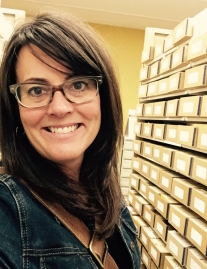Meet our Faculty

• Landscapes place and space
• The construction of negotiation of cultural identities and the politics of representation
As part of the larger project "Articulating Place and Identity: Social and Spatial Exclusion/Inclusion of Asylum Seekers in Ireland" this research maps the location of the State controlled asylum seeker Direct Provision Accommodation Centres across Ireland.
For details click here.

Research Interests:
- East African herding societies
- Gender, pastoralism and development
- Indigenous languages, education and digital literacy
- Maternal health and well-being
- Threatened Indigenous heritage
- Visual anthropology
- Mursi (Mun) agro-pastoralists (Southern Ethiopia)
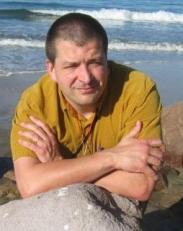
- Russian-speaking diaspora
- Russian Federation and its constituent populations
- French North America
- Nationalism and ethnicity
- Religion and Community
- Sociolinguistics and ethnolinguistics
- Language and education
- Métis Historical Communities, Métis ethnogenesis, Continental Métis and [French-]Canadien Communities
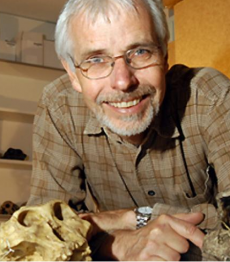
- Biological anthropology
- Skeletal Biology
- Forensic anthropology
- Human adaptability
- Nutritional anthropology
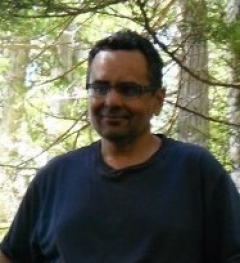
• Archaeological theory, technology and subsistence
• Complex foragers
• Archaeology of human origins
• First Nations and archaeology
• Northwestern North America
• Northeast Asia, Eastern Africa
- Ancestral First Nations land-use and settlement patterns between 11,000-5,000 years ago on the central coast of British Columbia. Using newly developed techniques and theoretical frameworks, Farid is examining the stone tool technology at the site of Namu, which is located in Heiltsuk Traditional Territory.
- Use of terrestrial mammal bone in coastal archaeological communities. An examination of the way in which land mammal remains in coastal sites are conceptualised by archaeologists.
- Pebble tools and fish processing. Experimental projects to assess the potential of using pebble tool technology to process salmon.The development of early hominid cognition during the Lower Palaeolithic, based on palaeoenvironmental and archaeologic evidence from Eastern Africa.
Adjunct Faculty
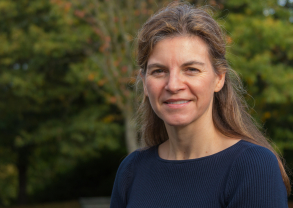
Dr. Erin Gibson
Adjunct Professor
BA (SFU), MPhil, PhD (Glasgow, Scotland)
University of Glasgow School of Humanities (Affiliate Reasearcher)
Stirling University Centre for Environment, Heritage and Policy (Associate Member)
• Heritage in contested landscapes
• Heritage as social action
• Community-based research
• The anthropology of momement and social interaction
- Plains Native Culture and Traditions
- Métis Culture and Traditions
- Plains/Métis Spirituality, Systems and Medicines
- Traditional Knowledge and Values
- Métis/Cree Oral History
- Traditional Education
- First Nations Dis eases, Pre-Contact and Post-Contact Medical Anthropology
- Language- Fluent in English and Learning Cree
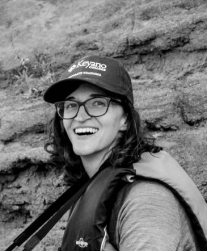
Dr. Tara Joly
BAS (Guelph), PhD (Aberdeen)
- Environmental Anthropology
- Indigenous Rights & Sovereignty
- Extractive Landscapes
- Community-Based Research
- Environmental Monitoring
- Ways of Knowing
Dr. Joly is an environmental anthropologist specializing in applied and community-based research with Indigenous peoples in northern Canada.
Dr. Joly’s research interests include Indigenous rights, extractive industries, disturbed landscapes, settler colonialism, human-animal and human-plant relations, history of science, and interdisciplinary studies. Her work examines Métis and other Indigenous responses to Alberta oil sands development, with an emphasis on (wet)land reclamation and encounters between different ways of knowing and using the environment. She is particularly interested in documenting how Indigenous land in settler colonial states is remade as extractive territory or settler home, and her research examines and supports processes by which Indigenous peoples assert sovereignty and renew relationships to place.
Prior to joining the Anthropology Department, Dr. Joly was a Research Director with Willow Springs Strategic Solutions, Inc., a social science research consulting firm based in Cochrane, Alberta. As a consultant, she conducted applied research projects in Alberta, including community-based research, traditional land use impact assessments, technical reviews, environmental monitoring research, and oral history research.
Previously, she was a Postdoctoral Fellow in the Department of Archaeology and Anthropology at the University of Saskatchewan, working with Dr. Clinton Westman and associated with the School of Environment and Sustainability, under a SSHRC-funded project, Cultural Politics of Energy – with which she remains affiliated. She received her PhD in Social Anthropology at the University of Aberdeen in 2017 (supervised by Drs. Rob Wishart and Nancy Wachowich, examined by Drs. David G. Anderson and Colin Samson).

Between 2012-2016 Dr. Oehler worked with Oka-Soiot herder-hunters of the Eastern Saian Mountains of South Central Siberia, where he conducted ethnographic and ethnohistorical research on human-animal relations. His PhD dissertation, entitled “Being Between Beings: Soiot Herder-Hunters in a Sacred Landscape,” explored local notions of the household and its multi-species members, emplaced in a landscape seen as sacred from both shamanist and Buddhist perspectives. His work on human-reindeer, horse, yak, dog, sheep, fish, and wolf relations problematizes conventional notions of 'wild' and 'tame' in the context of a posthumanist anthropology.
From 2009-2012 he conducted community-based research with the Inuvialuit Cultural Resource Centre, the Beaufort-Delta Education Council, and Aurora College. The project focused on the role of human-landscape-language relations in maintaining Inuvialuit (Inuit) cultural identity in the Western Canadian Arctic. His Master's thesis, entitled “Inuvialuit Language and Identity,” explored Inuvialuit language history, its contemporary symbolic meaning, as well as linguistic ideologies that continue to influence the state of ancestral language revitalization in the northern Northwest Territories. He also has an ongoing interest in the material culture of the north.
His teaching spans the four sub-fields of the discipline, ranging from introductory courses in social and medical anthropology to theory courses and special topics and upper division courses, including “Museums, Archives, and Source Communities,” “Environmental Anthropology,” and “Animals in Anthropology.”
Dr. Oehler is currently affiliated with Arctic Domus, a five-year project headed by Prof. David G. Anderson (University of Aberdeen) and funded by the European Research Council (ERC), which investigates “how people and animals today, and in the past, build sustainable communities around the circumpolar Arctic” (www.arcticdomus.org). Previously he was part of the “Northern Colonialism” research program, headed by Prof. Tim Ingold's “The North” theme at the University of Aberdeen, UK (http://www.abdn.ac.uk/the-north/research/).
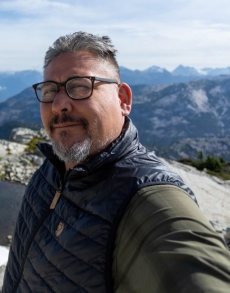
As a member of the Skwxwu7mesh Uxwumixw (Squamish Nation) most my research focuses on my home territory and surrounding areas of the Salish Sea. I also have broader interests on the Northwest Coast, the Plateau and western Sub-Arctic culture areas. My work focuses on bridging western science with various forms of Indigenous Knowledge. I achieve this through using geoarchaeological (lithic sources/quarries, site locations, sediments, remote sensing) and archeometric (14C dating, X-ray fluorescence, Scanning Electron Microscopy) techniques of archaeology and find links to Skwxwu7mesh
Nation/Indigenous Knowledge (oral history, toponymy, ancestry). I focus on this approach because it puts into practice the goals of Indigenous Archaeology through giving back the results of my research to the communities I work with. This makes my research relevant to academic scholars and to First Nations community members who have an interest in the past.
I also express my research interests through television media. I am the host of a currently 2 season series airing on Aboriginal Peoples Television Network (APTN) titled Wild Archaeology. This television series episodes spans across Canada and gives numerous examples of how archaeologist work in meaningful collaboration with Indigenous communities. This series one the Canadian Archaeological Association Public communications Award in 2017. I am also featured on 2 other of APTN’s series titles 1491 and Coyote Science and on the Knowledge Network on Edziza Life from Ash and Ice. I pursue these venues of disseminating knowledge as they reach a large mass of people in the effort to dispel misconceptions of Indigenous culture and history.
I am actively involved in the examination of unmarked graves in the contexts of Canadian Indian Residential Schools. Specifically, I am enmeshed in research at the residential schools at St. Pauls (North Vancouver) and St. Augustin’s (Sechelt). These are locales where my parents and ancestors were forced to attend.
My current research is focused on the long-term history of human and environmental interactions in Átl'ka7tsem (Howe Sound) under the newly designation UNESCO biosphere imitative. This research will provide data sets including ancient DNA, zooarchaeology mass spectrometry, stable isotope trophic levels, ancient environments, radiocarbon dating, and material analysis that historical and modern data sets cannot provide. For this initiative I am actively seeking graduate students with the probability of funding.

Dr. James A. McDonald
BA Hons (Manitoba), MA (Alberta), PhD (UBC)

